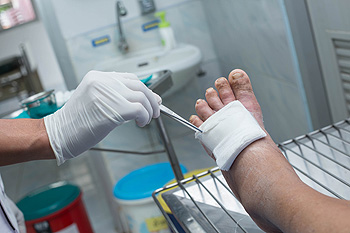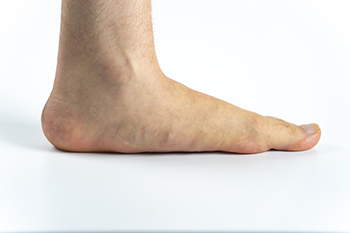Connect With Us
Blog
Items filtered by date: April 2022
Protecting Your Feet Against Ulcers

For many diabetics, regular foot care can become a new part of their life, specifically to battle neuropathy or peripheral artery disease. The poor circulation and nerve damage related to the disease can make it more difficult to detect injuries or sores on the feet and toes. As a result, open sores can become ulcerated because the healing process is slowed, and infections can set in more easily. Serious infections, if left untreated, can develop into gangrene and in extreme cases, lead to amputation. The first line of defense against foot ulcers is proper shoes, which can help to protect your feet from harm. Experts advise diabetics to avoid wearing high heels, sandals, stiff shoes, and flip-flops. They suggest wearing socks to prevent blisters and choosing shoes with ample toe room, a smooth inner lining, and a thick heel. It is also suggested that you examine your feet daily for sores, unusual coloration, or other abnormalities. If you are diabetic and have noticed problems with your feet, it is a good idea to make regular visits to a podiatrist for examination and treatment.
Diabetic foot care is important in preventing foot ailments such as ulcers. If you are suffering from diabetes or have any other concerns about your feet, contact one of our podiatrists from Podiatry Care Specialists. Our doctors can provide the care you need to keep you pain-free and on your feet.
Diabetic Foot Care
Diabetes affects millions of people every year. The condition can damage blood vessels in many parts of the body, especially the feet. Because of this, taking care of your feet is essential if you have diabetes, and having a podiatrist help monitor your foot health is highly recommended.
The Importance of Caring for Your Feet
- Routinely inspect your feet for bruises or sores.
- Wear socks that fit your feet comfortably.
- Wear comfortable shoes that provide adequate support.
Patients with diabetes should have their doctor monitor their blood levels, as blood sugar levels play such a huge role in diabetic care. Monitoring these levels on a regular basis is highly advised.
It is always best to inform your healthcare professional of any concerns you may have regarding your feet, especially for diabetic patients. Early treatment and routine foot examinations are keys to maintaining proper health, especially because severe complications can arise if proper treatment is not applied.
If you have any questions please feel free to contact our offices located in West Chester, and Broomall, PA . We offer the newest diagnostic and treatment technologies for all your foot and ankle needs.
How You Can Protect Your Limbs as a Diabetic
While complications of diabetes, such as poor circulation and neuropathy, can make a wound easier to develop and harder to detect and heal, there are many preventative measures you and your podiatrist can take to reduce your risk of amputation. On your end, make foot care a priority. Wear shoes and socks that fit well and don’t rub against any part of your feet or cut off circulation. Avoid walking barefoot. Elevate your feet and wiggle your toes frequently to keep the blood flowing. Eat a balanced diet and exercise to help manage your sugar levels and maintain a healthy body weight. Don’t smoke. Inspect your feet twice a day, using a mirror if needed, to see the bottom of your feet. Get to your podiatrist right away if you spot anything unusual. Early recognition/treatment of a problem can greatly reduce your risk of amputation. Some wounds may be avoided by getting regular foot screenings and having a podiatrist trim your toenails and treat any corns or calluses. They may also prescribe diabetic shoes and create custom orthotics to prevent foot injuries. If a wound does develop, your podiatrist can dress your wound appropriately, remove dead skin and tissue (debridement), reduce pressure and friction on the wound, and help restore adequate blood flow. They can also advise you on how to properly care for your wound at home. In cases where a higher level of wound care is necessary, your podiatrist may be able to use skin or bone grafts, or perform reconstructive surgery to replace or rebuild infected or necrotic bones, tendons and tissue.
Limb salvage can be an effective way in preventing the need for limb amputation. If you have diabetes, cancer, or any other condition that could lead to foot amputation if left unchecked, consult with one of our podiatrists from Podiatry Care Specialists. Our doctors will assess your condition and provide you with quality foot and ankle treatment.
What Is Limb Salvage?
Limb salvage is the attempt of saving a limb, such as the foot from amputation. Podiatrists also try to make sure that there is enough function in the foot after the salvage that it is still usable. Diabetes is the number one cause of non-traumatic amputations in the United States. Those with diabetes experience poor blood circulation, which prevents proper healing of an ulcer. If the ulcer is left uncheck, it could become infected, which could result in the need for amputation.
However, there are other causes as well, such as cancer and traumatic injury. Links between higher mortality rates and amputation have been found. This translates into higher healthcare costs, and a reduced quality of life and mobility for amputees. Podiatrists have attempted to increase the prevalence of limb salvage in an attempt to solve these issues.
Diagnosis and Treatment
Limb salvage teams have grown in recent years that utilize a number of different treatments to save the infected limb. This includes podiatrists that specialize in wound care, rehabilitation, orthotics, and surgery. Through a combination of these methods, limb salvage has been found to be an effective treatment for infected limbs, and as an alternative to amputation. Podiatrists will first evaluate the potential for limb salvage and determine if the limb can be saved or must be amputated.
If you have any questions, please feel free to contact our offices located in West Chester, and Broomall, PA . We offer the newest diagnostic and treatment technologies for all your foot care needs.
Are You Suffering From Nerve Damage?
Different Running Paths Will Determine the Type of Running Shoes
 Finding the correct running shoes for you, and your style of running is important because they provide a foundation for your body. The right shoes will fit well from the start, and should not have to be broken in. Most runners find it helpful to be aware of what type of surface they plan to run on. The choices are generally gravel paths or trails, and there are running shoes that are made for both types. Research has shown that the majority of running shoes will last between four to five hundred miles, which equates to three to four months for regular runners. Shoes that are made to run on roads or pavements are made of light and flexible materials, and have smoother soles. Cleats are found on shoes that are made for trails, which can provide a better grip. If you are a runner, or are considering running as a hobby, please check with a podiatrist who can answer any questions you may have about how to choose the pair of running shoes for you.
Finding the correct running shoes for you, and your style of running is important because they provide a foundation for your body. The right shoes will fit well from the start, and should not have to be broken in. Most runners find it helpful to be aware of what type of surface they plan to run on. The choices are generally gravel paths or trails, and there are running shoes that are made for both types. Research has shown that the majority of running shoes will last between four to five hundred miles, which equates to three to four months for regular runners. Shoes that are made to run on roads or pavements are made of light and flexible materials, and have smoother soles. Cleats are found on shoes that are made for trails, which can provide a better grip. If you are a runner, or are considering running as a hobby, please check with a podiatrist who can answer any questions you may have about how to choose the pair of running shoes for you.
If you are a runner, wearing the right running shoe is essential. For more information, contact one of our podiatrists from Podiatry Care Specialists. Our doctors can provide the care you need to keep you pain-free and on your feet.
Choosing the Right Running Shoe for Your Foot Type
To increase performance and avoid the risk of injury, it is important to choose the right running shoe based on your foot type. The general design of running shoes revolves around pronation, which is how the ankle rolls from outside to inside when the foot strikes the ground.
- Neutral runners are able to choose from a wide variety of shoes, including minimalist shoes or even going barefoot.
- Runners who overpronate, or experience an over-abundance of ankle rolling, should choose shoes that provide extra motion control and stability.
- Runners who underpronate, or supinate, have feet that have high arches and lack flexibility, preventing shock absorption. They require shoes with more flexibility and cushion.
If you have any questions please feel free to contact our offices located in West Chester, and Broomall, PA . We offer the newest diagnostic and treatment technologies for all your foot and ankle needs.
Two Types of Flat Feet
 There are many people that are born with flat feet. This condition can be identified by standing on the floor and noting if the entire foot lies flat. Additionally, flat feet may be part of a genetic disorder, and there may be pain in the feet and ankles that are associated with it. Research has shown there are two types of flat feet. Rigid flat feet indicate the arch is completely missing, and flexible flat feet show the arch is present when the patient sits or stands. People who have pain that is related to flat feet may find mild relief when custom made orthotics are worn, in addition to wearing sturdy shoes. If there is pain from this condition, it may be associated with tight tendons or bone problems. If you have flat feet, it is suggested that you schedule a visit with a podiatrist who can properly assess this condition.
There are many people that are born with flat feet. This condition can be identified by standing on the floor and noting if the entire foot lies flat. Additionally, flat feet may be part of a genetic disorder, and there may be pain in the feet and ankles that are associated with it. Research has shown there are two types of flat feet. Rigid flat feet indicate the arch is completely missing, and flexible flat feet show the arch is present when the patient sits or stands. People who have pain that is related to flat feet may find mild relief when custom made orthotics are worn, in addition to wearing sturdy shoes. If there is pain from this condition, it may be associated with tight tendons or bone problems. If you have flat feet, it is suggested that you schedule a visit with a podiatrist who can properly assess this condition.
Flatfoot is a condition many people suffer from. If you have flat feet, contact one of our podiatrists from Podiatry Care Specialists. Our doctors will treat your foot and ankle needs.
What Are Flat Feet?
Flatfoot is a condition in which the arch of the foot is depressed and the sole of the foot is almost completely in contact with the ground. About 20-30% of the population generally has flat feet because their arches never formed during growth.
Conditions & Problems:
Having flat feet makes it difficult to run or walk because of the stress placed on the ankles.
Alignment – The general alignment of your legs can be disrupted, because the ankles move inward which can cause major discomfort.
Knees – If you have complications with your knees, flat feet can be a contributor to arthritis in that area.
Symptoms
- Pain around the heel or arch area
- Trouble standing on the tip toe
- Swelling around the inside of the ankle
- Flat look to one or both feet
- Having your shoes feel uneven when worn
Treatment
If you are experiencing pain and stress on the foot you may weaken the posterior tibial tendon, which runs around the inside of the ankle.
If you have any questions please feel free to contact our offices located in West Chester, and Broomall, PA . We offer the newest diagnostic and treatment technologies for all your foot and ankle needs.


